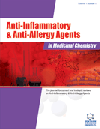-
s Evaluation of the Anti-Inflammatory Activities of Diclofenac Sodium, Prednisolone and Atorvastatin in Combination with Ascorbic Acid
- Source: Anti-Inflammatory & Anti-Allergy Agents in Medicinal Chemistry, Volume 19, Issue 3, Sep 2020, p. 291 - 301
-
- 01 Sep 2020
Abstract
Objectives: Inflammation is our body’s normal defense mechanism, but in some cases, it may be responsible for causing different kinds of disorders. Several antiinflammatory drugs are present for the treatment of these disorders; however, the conventional anti-inflammatory drugs cause side effects when used in the long term and therefore, it is better to use them in a low dose for a shorter duration of time. This study was designed to find out whether there is an augmentation of the therapeutic effectiveness of the antiinflammatory drugs like diclofenac sodium (NSAID), prednisolone (steroid) and atorvastatin (statin) when used in combination with ascorbic acid (antioxidant). Methods: Wistar Rats (n=144) were selected and divided into 24 groups of 6 rats in each. Carrageenan and formalin were used to induce local inflammation and neuropsychiatric effects, respectively. The inhibitions of such responses were measured after administering a drug alone and in combination with ascorbic acid. Results: In case of carrageenan mediated inflammation, the combination of 5 mg/kg diclofenac and 200 mg/kg ascorbic acid gave the highest inhibition of 74.19% compared to other groups of drugs. The combination of 5 mg/kg diclofenac and 200 mg/kg ascorbic acid gave 97.25% inhibition for formalin-mediated inflammation group. In both cases, combination therapy showed statistically significant anti-inflammatory activities compared to monotherapy (p values <0.05). Conclusion: All the data clearly indicate new combinations of drug therapy comprising diclofenac sodium, prednisolone, atorvastatin with ascorbic acid, which may be more effective against both local edema and the neuropsychiatric effect caused due to inflammation.


